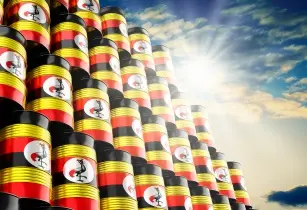Africa must be helped to secure the economic benefits from oil and gas development which can help raise millions of people out of poverty, the 10th annual East African Petroleum Conference and Exhibition was told
Delegates at the event, which was staged in Uganda’s capital city Kampala, were addressed on how the continent is one of the most carbon-positive continents on the planet and should be allowed to secure its own path to much needed economic development.
The event was staged at a time when Uganda is on course to become an oil and gas producing country for the first time with it being intended that first oil will be pumped by 2025. The 1,445-km East Africa Crude Oil Pipeline (EACOP) is being built to transport the natural resource from Uganda through Tanzania for export.
Uganda’s Vice President Jessica Alupo represented the country’s President, Yoweri Museveni, at the event. In remarks delivered to the conference, Museveni said the oil and gas development in the country was essential for the "wealth of the region".
He said, “Without energy, the East African Community cannot achieve the intended goals of integration with the aim of achieving economic, social and political integration so as to create wealth in the region and enhance competitiveness through increased production, trade and investment in the oil and gas sector”.
He emphasised that the region recognises the challenges posed by climate change and governments are committed to ensuring energy developments are implemented with measures to protect the environment. He highlighted further projects to develop energy from wind, solar and sustainable biomass for isolated off grid communities and said Uganda is pursuing a programme to develop nearly 52,000 MW of hydro power by 2040.
The Ministry of Energy and Mineral Development’s permanent secretary, Irene Batebe, told delegates of the steps being put in place to ensure oil and gas sector would help deliver economic development for all Ugandans.
A Uganda Petroleum Fund has been established and it has been calculated that over the next 25 years the country’s oil and gas development will provide a boost of more than US$40bn to the economy, bringing a potentially transformative impact for many in the country.
Uganda’s oil and gas sector has been under criticism by climate activists, with campaigners in particularly having campaigned against the planned construction of the East Africa Crude Oil Pipeline. They have targeted global banks and insurance firms urging them not to finance the pipeline project to take Uganda’s oil to market through Tanzania’s Port of Tanga.
The Ugandan government and its private sector partners have explained that the latest technological innovations are being used to ensure Uganda’s oil projects generate the lowest carbon footprint possible, ensuring that together the projects have been classified as falling within the category of ‘low emission’.
In addition, a significant reforestation operation, which will be part-paid for by revenue generated by the oil development, is underway, led by the Uganda Wildlife Authority and the National Forestry Authority as part of a parcel of commitments by Uganda to meet the strong commitments made by the country at the recent COP26 and COP27 conferences to combat climate change.
The three-day East African Petroleum Conference and Exhibition is being held under the theme ‘East Africa as a hub for investment in exploration and exploitation of petroleum resources for sustainable energy and socioeconomic development’. The event aims to attract petroleum stakeholders in the region to discuss investment opportunities in the oil and gas sector.
Other discussions to dominate the event included the subject of Africa and climate change and the continent’s need to find adaptation measures. Among the announcements made and issues discussed at the event were:
Uganda’s Energy Minister Ruth Nankabirwa joined officials from the energy sector in East Africa to call for continued exploration and production of oil resources to cushion citizens from energy poverty. She also said that the final investment decision in the development of Uganda’s new refinery is expected to be announced next month. The refinery is expected to begin production activities earliest in 2027.
East African Community (EAC) secretary general Peter Mathuki proposed a joint natural resource exploration arrangement by the seven EAC partner states to help attract foreign investment while also seeking to make the region more financially self-reliant for oil and gas developments.
It was announced that Uganda and the Democratic Republic of the Congo have commenced bilateral talks on how they could share oil and gas infrastructure. It is hoped that the East Africa Community will develop a common energy policy to be backed by a protocol that will define the regional framework to support the development of the sector.
The conference coincides with East Africa Community’s commitment to implement its EAC Vision 2050 plan, which seeks to ensure a sustainable, adequate, affordable, competitive, secure and reliable supply of energy to meet regional needs at the least cost.




